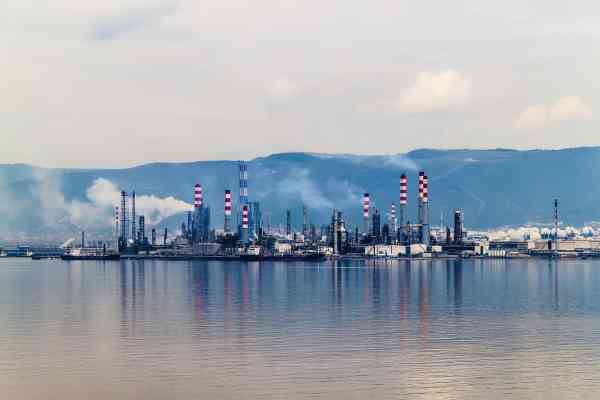February 2nd, 2021 | 10:30 CET
Nikola, Saturn Oil & Gas, Exxon Mobil - Caution, risk of explosion!
Stocks can rise for a variety of reasons. As we saw last week, a group of primarily younger investment community members can sometimes shoot up a company's value several hundred percent, as was seen in GameStop. There are of course other reasons that are understandable and justified on a fundamental level. In contrast to the "Reddit shares," the newly achieved price level should be maintained here.
time to read: 3 minutes
|
Author:
Stefan Feulner
ISIN:
CA80412L1076 , US6541101050 , US30231G1022
Table of contents:

"[...] When we acquire something, we want to make sure that the acquisition fits with our strategy and has the potential to be successful for our shareholders. [...]" John Jeffrey, CEO, Saturn Oil & Gas Inc.
Author
Stefan Feulner
The native Franconian has more than 20 years of stock exchange experience and a broadly diversified network.
He is passionate about analyzing a wide variety of business models and investigating new trends.
Tag cloud
Shares cloud
The oil price and the future
It was less than a year ago when a mega crash shook the oil price. After hitting a high of USD 70.27 in January 2020, the black gold fell to a whopping USD 17 by mid-April in the wake of the Corona Crisis and the proclaimed lockdowns. After that, a massive recovery set in. We have not yet reached the pre-crisis levels, but at current prices around USD 56.0, a clear upward trend is discernible. But where do we go from here? According to analysts at JP Morgan, the oil price is in a supercycle that will last until 2025 and bring us prices of up to USD 190 per barrel. Christyan Malek, Head of Oil Research EMEA at JP Morgan, sees the following scenario as the reason: The oil market could turn into a supply deficit in 2021/2022, which would drive the Brent price enormously. This, in turn, would motivate producers to produce more crude oil. The deficit, Malek estimates, could still reach 6.8 million bpd by 2025, and this could cause prices to rise to USD 100 or more.
The primary beneficiary of the supercycle
Should the scenario discussed by JP Morgan come to pass and oil prices more than triple in the next four years, major oil companies such as ExxonMobil, formed in 1999 by the merger of Exxon and Mobil Oil, BP, Shell or Total, will naturally be the first beneficiaries. One Company that still has an advantage over the big players and therefore acts as a lever on further rising oil prices is the share of the oil producer Saturn Oil & Gas. In 2019 the Canadians produced a barrel for a mere USD 12. The competition from the above-mentioned oil giants have production costs of more than USD 30 on average in the balance sheet.
On the home stretch
If it is up to Saturn Oil & Gas CEO John Jeffrey, the costs of around USD 12 per barrel should remain the same. According to the experienced Company leader, this is easier and cheaper to achieve by acquiring competitors than by producing crude oil oneself. The Company already made a start last year on identifying suitable takeover targets and various due diligence reviews are currently underway. An acquisition can be expected to be completed in the next few weeks.
Internally, Saturn Oil & Gas has already positioned itself for a higher level of play. The Company has hired Wendy Woolsey as its new chief financial officer. Woolsey has 25 years of experience in the oil industry. In addition, the renowned manager Jean-Pierre Colin was hired as a strategy consultant for the Mergers & Acquisitions division. Colin made a name for himself primarily by selling his Eleonor project for more than USD 1 billion to Goldcorp Inc, now known as Newmont Corporation, and by various consulting mandates for the Canadian government, among others. For the entrepreneurial fox, Saturn Oil & Gas presents a unique opportunity to build an oil and gas acquisition vehicle that offers inorganic growth opportunities and returns for its shareholders and other key stakeholders. Currently, the stock market value of the Canadian Company is EUR 16.7 million. If the expected acquisition goes through, the Company is likely to face a revaluation.
Reddit and no end
Where will the next short squeeze take place? Investors around the world are looking for the new GameStop. After an eightfold increase, they are trying to find the successors, on the one hand, to make life difficult for hedge funds, and mainly, of course, to be able to pocket horrifying profits. One stock repeatedly mentioned in connection with a short squeeze is the paper of truck builder Nikola. The short ratio is almost 40% at the moment. The share is quoted at USD 23.10. A breakout of the downward trend formed since June last year would occur at just under USD 24. The specialist in the construction of trucks with fuel cell technology had reached a high in 2020 at USD 96.90.
Conflict of interest
Pursuant to §85 of the German Securities Trading Act (WpHG), we point out that Apaton Finance GmbH as well as partners, authors or employees of Apaton Finance GmbH (hereinafter referred to as "Relevant Persons") may in the future hold shares or other financial instruments of the mentioned companies or will bet on rising or falling on rising or falling prices and therefore a conflict of interest may arise in the future. conflict of interest may arise in the future. The Relevant Persons reserve the shares or other financial instruments of the company at any time (hereinafter referred to as the company at any time (hereinafter referred to as a "Transaction"). "Transaction"). Transactions may under certain circumstances influence the respective price of the shares or other financial instruments of the of the Company.
Furthermore, Apaton Finance GmbH reserves the right to enter into future relationships with the company or with third parties in relation to reports on the company. with regard to reports on the company, which are published within the scope of the Apaton Finance GmbH as well as in the social media, on partner sites or in e-mails, on partner sites or in e-mails. The above references to existing conflicts of interest apply apply to all types and forms of publication used by Apaton Finance GmbH uses for publications on companies.
Risk notice
Apaton Finance GmbH offers editors, agencies and companies the opportunity to publish commentaries, interviews, summaries, news and etc. on news.financial. These contents serve information for readers and does not constitute a call to action or recommendations, neither explicitly nor implicitly. implicitly, they are to be understood as an assurance of possible price be understood. The contents do not replace individual professional investment advice and do not constitute an offer to sell the share(s) offer to sell the share(s) or other financial instrument(s) in question, nor is it an nor an invitation to buy or sell such.
The content is expressly not a financial analysis, but rather financial analysis, but rather journalistic or advertising texts. Readers or users who make investment decisions or carry out transactions on the basis decisions or transactions on the basis of the information provided here act completely at their own risk. There is no contractual relationship between between Apaton Finance GmbH and its readers or the users of its offers. users of its offers, as our information only refers to the company and not to the company, but not to the investment decision of the reader or user. or user.
The acquisition of financial instruments entails high risks that can lead to the total loss of the capital invested. The information published by Apaton Finance GmbH and its authors are based on careful research on careful research, nevertheless no liability for financial losses financial losses or a content guarantee for topicality, correctness, adequacy and completeness of the contents offered here. contents offered here. Please also note our Terms of use.




